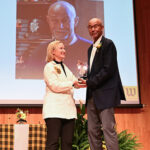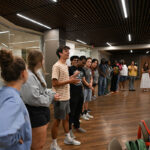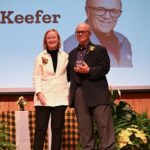
Triple major studies differing resources and utilizes multiple research styles
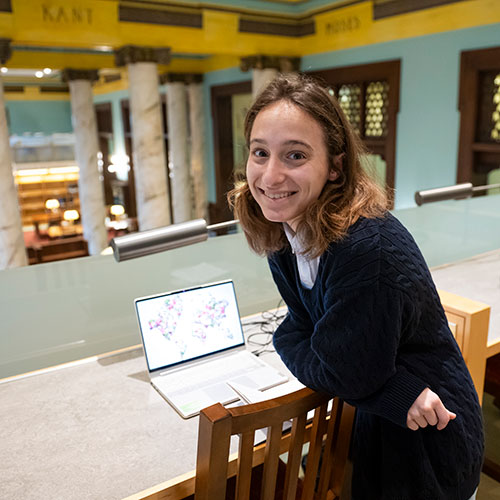
When Athena Tharenos ’24 first arrived at The College of Wooster, she didn’t consider herself much of an academic, nor did she see a future in research or graduate school. Then, with the support of the College and faculty advisors, she became a rare triple major in anthropology, environmental geoscience, and Chinese studies.
“I’ve been encouraged as someone who can contribute to the world through my research and work,” said Tharenos, who also ran year-round for Wooster’s cross country, indoor track, and outdoor track teams. “I don’t think I could have been quite as encouraged at another college, and a lot of doors were open for me that I didn’t think were possible.” The doors kept opening when it came time for Independent Study research in Washington, D.C. and Greece.
For her geoscience I.S., Tharenos pursued a classic geopolitics topic combining Arctic geology, climate change, and international relations. Mark Wilson, Lewis M. and Marian Senter Nixon Professor of Natural Sciences, mentored Tharenos throughout the study and connected her with Wooster alumnus Stephen Dornbos ’97 at the U.S. Department of Defense to discuss the importance of the region to national security. “Athena examined the changes to international commercial and military policies in the Arctic as it warms (reducing ice cover) and increases competition for resources and transportation routes,” explained Wilson. “This is an important analysis of the policy options we face in the next decade and beyond.”
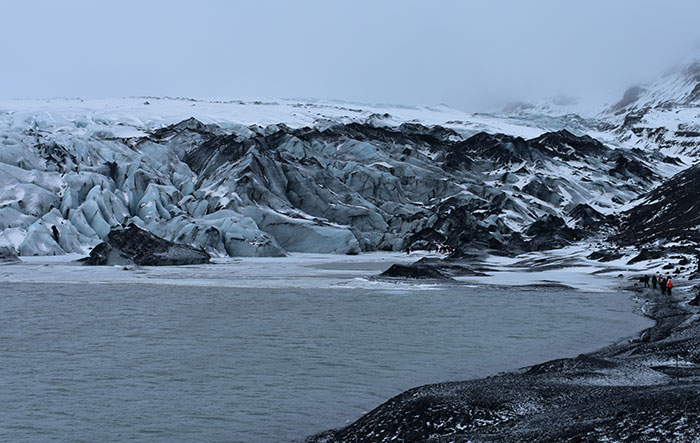
Tharenos became interested in the effects of melting glaciers after seeing this Icelandic glacier and corresponding glacial lake while visiting the Arctic Circle though an environmental volunteering program with her high school.
While investigating the focused efforts to increase northern petroleum exploration and shipping operations, Tharenos used “constant citations” of other researchers, governmental regulations, and international policies. She felt out of her comfort zone, both challenged and excited by working in unfamiliar territory. “Every day I learned new things, having to push myself into new realms of understanding and to utilize new tools of analysis,” she said.
Wilson called her a superb writer and a very deliberate reader, adding, “She kept detailed notes on her many literature sources so that she could weave together sophisticated environmental and geopolitical interpretations for her thesis.”
This writing skill was also imperative for her second I.S.—an ethnographic study anchored in storytelling. And though her research took her all the way to the Greek island of Rhodes, it was much closer to her heart. During a 2021 trip she gifted her 87-year-old grandfather for his birthday, Tharenos’ uncle told endless stories about plots of land that belonged to their family. She realized that even abandoned lots and overgrown olive groves possess a rich history with stories, family ties, and other value that she wanted to explore.
“With a cigarette pinched between his lips, my uncle kept saying, ‘Athena, this is your history and you need to know it!’ So I wanted to share these and other people’s stories,” said Tharenos. She spent the next two summers conducting fieldwork in Greece and also learned to speak Greek. She visited a university library on the island for historical facts and economic insights. She traced parts of her family lineage to connect plot ownership. But the majority of her immersive Rhodian research happened on front porches as she chatted with people about family history, childhood, and the memories about their family land. From conversations with a great aunt in broken Greek to chats with a market vendor selling cherries—every interaction informed Tharenos of life on Rhodes.
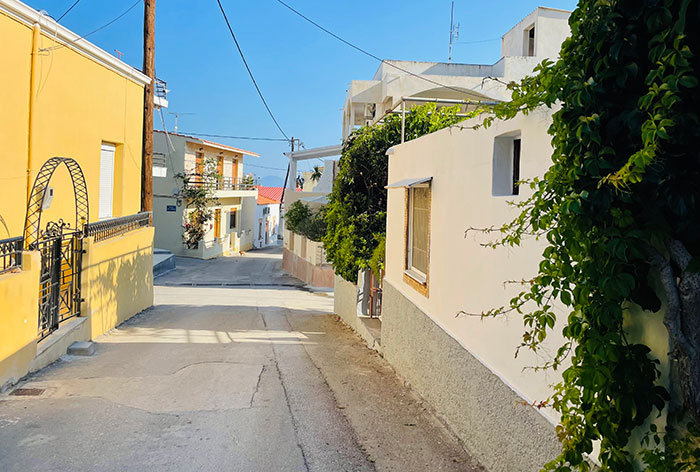
On the right is Tharenos’ family home in the village of Paradisi, Greece on the Isle of Rhodes, passed down through a maternal line of inheritance.
She discovered how multigenerational inheritance practices are creating value, and she recognized a contrast between Rhodian society’s emphasis on relational/community wealth being more emotional/somatic versus a traditional fiscal wealth. “There’s legitimate value that’s being placed above fiscal value, and it’s intriguing to see in a place as economically engaged as Rhodes,” said Tharenos, noting tourism is a big focus on the island. “They talk a lot about money in interviews, but when it comes to land, that’s always outside that sphere of money.”
The locals valued Tharenos’ attempts to speak and learn Greek, too. “I was able to do this research because I was considered a part of this community,” she said. “There’s a theme with I.S. that students do projects about their home community, but I was able to discover a community I never knew I had.”
Heather Fitz Gibbon, professor of sociology & anthropology and chair of urban studies, mentored Tharenos and taught her Ethnographic Methods class a few years ago. She said, “Athena is self-directed, persistent, and highly motivated, and she has a keen eye for ethnography. She is able to go into unfamiliar places and find meaning in what for others would seem to be mundane situations.”
For her next adventure, Tharenos plans to attend the University of Oxford and work toward a master’s of philosophy in development studies. “I don’t know where I’m going yet after Oxford, but I will make sure I can make a difference,” she said.
This feature originally appeared in the Summer 2024 issue of Wooster magazine.
Posted in Independent Study, Magazine on July 1, 2024.
Related Posts
Related Areas of Study
Earth Sciences
Geology, environmental geoscience, geophysics, and other classes that explore Earth and the impact of humans
Major MinorEnvironmental Geoscience
Investigate the impact humans have on the Earth and research ways to solve pressing environmental problems.
Major MinorChinese Studies
A multidisciplinary approach to specializing in the languages, literature, history and people of China
Major MinorAnthropology
Use problem-solving and research skills to explore and understand communities and cultures in every part of the world.
Major Minor
